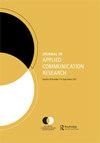Pandemic communication as transformation
IF 1.7
2区 文学
Q2 COMMUNICATION
引用次数: 0
Abstract
The global pathways of the COVID-19 pandemic, the textured layers of the inequalities in pandemic outbreaks, the deep inequalities in ownership and patterns of access to basic preventive and healthcare resources, and the interpenetrating precarities produced by hegemonic pandemic responses divulge the violence of the capitalist-colonial project. The raced and classed nature of these inequalities necessitate critical theorizing that attends to the relationship between communication and the organizing structures of racial capitalism. Also, the COVID-19 pandemic is constituted amidst global changes in ecosystems and changing human–animal relationships and mobilities, foregrounding the interpenetrating relationship between climate colonialism and the crises it produces. How does communication theory explain, interpret, and critique communicative practices around the pandemic that are constituted amidst the interpenetrating linkages between colonialism and capitalism? How to theorize the communicative practices generating pandemic disinformation and hate, rooted in networks of white supremacy, and directed at communities at the margins? How do communities at the margins build communication strategies that sustain them, offer an organizing ethic of care and mutuality, and resist the disinformation seeded and circulated by white supremacists and other connected hate infrastructures such as Hindutva in India and far-right in Israel? What role does communication practice play in resisting the organizing structures that (re)produce raced, classed, gendered inequalities rendered visible during the pandemic? The articles in this volume collectively explore diverse forms of communicative practices amidst the pandemic, negotiating the organizing structures that both constrain and enable everyday life in crisis. These communicative practices depict the dynamic nature of individual, relational, and community agency, reflected in community resilience amidst the proliferation of stigmatizing hate, the roles of organizational and supervisor support in constituting the resilience of young adult workers, the role of stories in constituting the negotiations of healthcare amidst the pandemic, and the organizing practices that support the negotiations of the pandemic. Shinya Uekusa explores the relational role of community translators in mediating and negotiating the communicative rights of communities at the margins amidst the pandemic, interrogating top-down forms of crisis response that are disconnected from questions of communicative inequality. The evocative article by Anis Rahman and colleagues draws on autoethnographic notes to render visible the precarities of academic life amidst the pandemic, exacerbated by the ongoing neoliberal transformation of the academe. They invite us to communicative practices of self-reflection, negotiation of labor, and collaborative dialogue as anchors to building and sustaining equity in the academe.流行病传播是一种转变
COVID-19大流行的全球路径、大流行爆发中不平等的纹理层、基本预防和医疗资源的所有权和获取模式方面的深刻不平等,以及霸权大流行应对措施所产生的相互渗透的不稳定性,都揭示了资本主义-殖民项目的暴力。这些不平等的种族和阶级本质需要批判性的理论来关注交流与种族资本主义组织结构之间的关系。此外,2019冠状病毒病大流行是在全球生态系统变化和人类与动物关系和流动性变化的背景下形成的,这凸显了气候殖民主义与其产生的危机之间的相互渗透关系。传播理论如何解释、解释和批判在殖民主义和资本主义之间相互渗透的联系中形成的围绕流行病的传播实践?如何将产生大规模虚假信息和仇恨的传播实践理论化,这些传播行为根植于白人至上网络,并针对边缘社区?边缘社区如何建立沟通策略来维持他们,提供有组织的关怀和互助伦理,并抵制白人至上主义者和其他相关仇恨基础设施(如印度的印度教和以色列的极右翼)播下和传播的虚假信息?传播实践在抵制(重新)产生在大流行期间可见的种族、阶级和性别不平等的组织结构方面发挥了什么作用?本卷中的文章共同探讨了大流行期间各种形式的沟通实践,谈判既限制又使危机中的日常生活成为可能的组织结构。这些交流实践描绘了个人、关系和社区机构的动态性质,反映在污名化仇恨扩散中的社区复原力、组织和主管支持在构成年轻成年工人复原力方面的作用、故事在构成大流行期间医疗保健谈判中的作用,以及支持大流行谈判的组织实践。Shinya Uekusa探讨了社区翻译在大流行边缘社区沟通权的调解和谈判中的关系作用,质疑与沟通不平等问题脱节的自上而下的危机应对形式。Anis Rahman及其同事撰写的这篇令人回味的文章利用了自己的民族志笔记,揭示了流行病中学术生活的不稳定性,学术界正在进行的新自由主义转型加剧了这种不稳定性。他们邀请我们进行自我反思、劳动谈判和协作对话等交流实践,作为建立和维持学术界公平的基础。
本文章由计算机程序翻译,如有差异,请以英文原文为准。
求助全文
约1分钟内获得全文
求助全文
来源期刊

Journal of Applied Communication Research
COMMUNICATION-
CiteScore
4.00
自引率
8.70%
发文量
52
期刊介绍:
The Journal of Applied Communication Research publishes original scholarship that addresses or challenges the relation between theory and practice in understanding communication in applied contexts. All theoretical and methodological approaches are welcome, as are all contextual areas. Original research studies should apply existing theory and research to practical solutions, problems, and practices should illuminate how embodied activities inform and reform existing theory or should contribute to theory development. Research articles should offer critical summaries of theory or research and demonstrate ways in which the critique can be used to explain, improve or understand communication practices or process in a specific context.
 求助内容:
求助内容: 应助结果提醒方式:
应助结果提醒方式:


